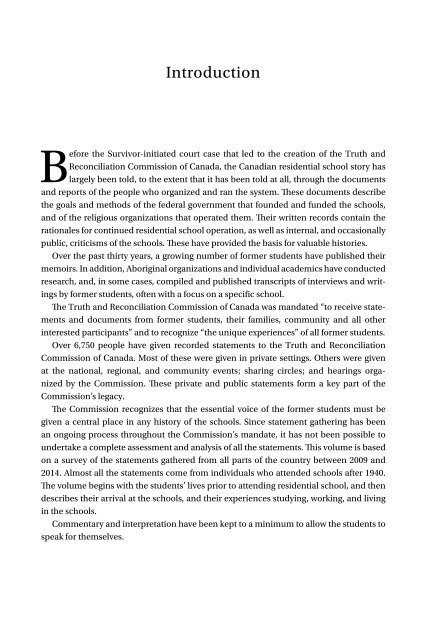The Survivors Speak
1MB8J05
1MB8J05
You also want an ePaper? Increase the reach of your titles
YUMPU automatically turns print PDFs into web optimized ePapers that Google loves.
Introduction<br />
Before the Survivor-initiated court case that led to the creation of the Truth and<br />
Reconciliation Commission of Canada, the Canadian residential school story has<br />
largely been told, to the extent that it has been told at all, through the documents<br />
and reports of the people who organized and ran the system. <strong>The</strong>se documents describe<br />
the goals and methods of the federal government that founded and funded the schools,<br />
and of the religious organizations that operated them. <strong>The</strong>ir written records contain the<br />
rationales for continued residential school operation, as well as internal, and occasionally<br />
public, criticisms of the schools. <strong>The</strong>se have provided the basis for valuable histories.<br />
Over the past thirty years, a growing number of former students have published their<br />
memoirs. In addition, Aboriginal organizations and individual academics have conducted<br />
research, and, in some cases, compiled and published transcripts of interviews and writings<br />
by former students, often with a focus on a specific school.<br />
<strong>The</strong> Truth and Reconciliation Commission of Canada was mandated “to receive statements<br />
and documents from former students, their families, community and all other<br />
interested participants” and to recognize “the unique experiences” of all former students.<br />
Over 6,750 people have given recorded statements to the Truth and Reconciliation<br />
Commission of Canada. Most of these were given in private settings. Others were given<br />
at the national, regional, and community events; sharing circles; and hearings organized<br />
by the Commission. <strong>The</strong>se private and public statements form a key part of the<br />
Commission’s legacy.<br />
<strong>The</strong> Commission recognizes that the essential voice of the former students must be<br />
given a central place in any history of the schools. Since statement gathering has been<br />
an ongoing process throughout the Commission’s mandate, it has not been possible to<br />
undertake a complete assessment and analysis of all the statements. This volume is based<br />
on a survey of the statements gathered from all parts of the country between 2009 and<br />
2014. Almost all the statements come from individuals who attended schools after 1940.<br />
<strong>The</strong> volume begins with the students’ lives prior to attending residential school, and then<br />
describes their arrival at the schools, and their experiences studying, working, and living<br />
in the schools.<br />
Commentary and interpretation have been kept to a minimum to allow the students to<br />
speak for themselves.


